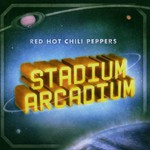Stadium Arcadium
Studio Album by Red Hot Chili Peppers released in 2006Stadium Arcadium review
Two disks, 28 songs, over two hours of music
After their first four albums, Red Hot Chili Peppers were not shaping up as million-sellers, scuppered by hard drugs and near-pathological tunelessness. Four albums later, they reside at the very top of the pile, rock-wise. The turnaround began with 1991's Blood Sugar Sex Magik, for which the quartet immersed themselves in music at Rick Rubin's mansion/studio in Hollywood. Crucially, the producer got erstwhile funk-grunter Anthony Kiedis to sing properly. Bravely, they've returned to Rubin now, at this sovereign point in their career. There's no seismic shift this time, just a deluge of material – two disks, 28 songs, over two hours of music. The double-album has always been the scourge of the over-productive band. Whether it's the apparent lapse in quality control, the invariable variety, a lack of patience or the sheer audacity, they're objects to be treated with utmost caution. Red Hot Chili Peppers, however, seem keen to rise to the challenge. Unlike other notable rock monoliths such as the Clash's Sandinista, there's hardly any doodling or misfiring to undermine the sheer vastness of Stadium Arcadium, a quasi-concept album, inspired by Kabbalah philosophy.
Stadium Arcadium yields a lot of great songs
Stadium Arcadium finds Red Hot Chili Peppers halfway through their 40s and well over halfway through their nine lives. In their 23 years together, the goof-ball frat boys have lived harder and faster than most bands dream of. Now, though, most of the band are proud parents and their concerns are somewhat different. These days, it's all about meditation and home cooking, gated mansions and new sets of teeth. Which means we get songs about pets dying (Death Of A Martian) and marriage proposals written to music (Hard To Concentrate); the latter written by singer Anthony Kiedis for bassist Flea and his girlfriend. Drugs are (for now) out of the picture, life and love are reaffirmed. That's not to say they've turned into simpering acoustic-botherers though; this album yields a lot of great songs. Hump De Bump is straight back to the old school - fast, goofy guitar toying, with reverberating bass, vocal gymnastics to match and odd brass squiggles. Storm In A Teacup is a P-funk Freaky Styley classic, sanded down to Californication-era smoothness, and John Frusciante gets to do what he does best on the likes of Turn It Again and Animal Bar. Here is a player increasingly interested in the sonic, tonal capabilities of his instrument as opposed to fret wankery.
The most ambitious work of Red Hot Chili Peppers’ twenty-three-year career
Ninth studio album from phenomenally successful stadium funk-rockers is a sprawling affair. They even recorded so much material, the original intention was to release three albums, at six-month intervals. Leaving behind the boyish tomfoolery and hard-living excess of old for tasteful musicianship and a gloss of studio sheen, here Red Hot Chili Peppers turn in more of the effortlessly slick songwriting they presented on their last couple of albums. After 2002's By the Way, the band's least funky album, Flea finally cuts loose again here, reasserting himself as the best non-hip-hop reason to buy a subwoofer. And then there's Kiedis, whose vocals keep improving at an age when many rockers start slipping their high notes to backup singers. He shows versatility throughout, from his dead-on impression of Jimi Hendrix (his biggest vocal influence) on Hump De Bump to a new country-rock growl on the chorus of the riff-o-rama track Readymade. Kiedis is also, more or less, the inventor of rap rock, and he embraces his roots, dropping the most rhymes on any album since Blood Sugar Sex Magik. Stadium Arcadium is the most ambitious work of the band’s twenty-three-year career – an attempt to consolidate everything that is Red Hot Chili Peppers, from their earlier, funnier funk-metal stuff to soul-baring Under the Bridge-style balladry to Californication vocal-harmony pop. It's a late-career triumph that could pass for another, lesser group's greatest-hits collection.

